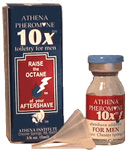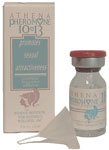When mammograms are more harm than help
 By Marie McCullough
By Marie McCulloughlink to original article
CANCER AWARENESS: OVERDIAGNOSIS IN
SCREENING FLAMES DEBATE by Marie McCullough
Copyright 2015 The Philadelphia Inquirer
(excerpted by Athena Institute)
"In the ongoing debate over the pros and cons of breast cancer screening with mammograms, one of the hottest issues is overdiagnosis---and its potential dangers to women.
'Overdiagnosis is the diagnosis of a tumor that would not have become clinically apparent in the absence of screening' explains an editorial in JAMA INTERNAL MEDICINE: 'Treatment of an overdiagnosed tumor cannot provide benefit, but it can lead to harm.'
***************
"A recent study led by biologist Winnifred Cutler, founder of the Athena Institute for women's Wellness in Chester Springs, focused on the risk for women who are near or past menopause---when most breast cancer is diagnosed. To eliminate what Cutler sees as flaws in the CDC's estimates, her team analyzed the data from 19 existing studies of more than 2.3 million women. They concluded that only 5 percent of screened women will be diagnosed over 25 years. (The CDC estimate is 7.2 percent.) ***** Cutler, who sells pheromone products that she says are scientifically shown to increase sexual attractiveness, believes healthy women with no history or symptoms of breast cancer should reject [mammogram] screening altogether."
[End of excerpt]
……………………………………………………………………….
To prepare for her comprehensive report above, Marie McCullough interviewed me about our breast cancer incidence study published in June 24, 2015 by The Public Library of Science.
She wanted me to elaborate on our study's recommendation that women without symptoms would be wise to avoid mammogram screening. We found that for a menopausal woman with no history of breast cancer, the harms of screening are so substantial and the benefits so minimal, that she might be wise to "just say no".
Ms. McCullough was interested in the method my co-authors and I used to examine 19 studies of 2,305,427 cancer-free women and "follow them forward" for up to 25 years. In sharp contrast, the CDC and other risk-estimating 'experts' take their data from people with disease. They use registries of cancer "cases" and then "work backward" to try to estimate the incidence risk of breast cancer in 'women'.
As the JAMA editorial states in Ms. McCullough's article, overdiagnosis leads to overtreatment of innocuous findings which in turn harms women who endure health-compromising stress, radiation and treatments that increase diseases elsewhere in their body. All told, this diminishes the woman's quality of life.
I believe the only clear "winners" in the widespread marketing of mammograms are those who earn income from promoting them. Not women patients, nor their partners, nor their families, nor those who bear the economic costs of these screenings and "treatments". Truly informed consumers would likely conclude as we have; screening mammograms are harmful to asymptomatic women with no prior history of breast cancer and should be avoided.
Winnifred Cutler, PhD
President and Founder
www.athenainstitute.com
Dr. Cutler's pheromone science has been "bottled" into vials of unscented fragrance additives that increase wearers' sexual attractiveness. AVAILABLE FOR PURCHASE HERE

